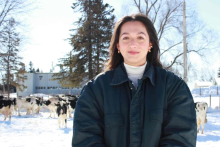In Canada, researchers from McGill University’s WELL-E Chair are using artificial intelligence to improve the welfare of dairy cows. At a farm in Montreal, high-definition cameras track cows’ movements, ear positions, and walking patterns to gather behavioral data. These subtle signals help assess the animals’ physical and mental health.


In March 2025, the GEFSES program hosted its annual international symposium, "Harnessing Genome Editing for Resilient Agriculture," in Ludhiana, India. The event was held in collaboration with Punjab Agricultural University (PAU) and Guru Angad Dev Veterinary and Animal Sciences University (GADVASU).

Congratulations to Xin Zhao, Distinguished James McGill Professor in the Department of Animal Science at McGill University, on being named Fellow of the American Dairy Science Association (ADSA). The ADSA will present Professor Zhao with this prestigious award on Tuesday, June 24, 2025, at their annual meeting in Louisville, Kentucky.
Please join us in congratulating the 2025 winners of the Macdonald Campus Gold Key Awards, selected for their outstanding contributions, passion, and commitment to enriching student life on our campus. Read their stories below.

Although Andrea Amado doesn’t come from an agricultural background, she was drawn to farms from a young age. Originally from Argentina, she moved to Sherbrooke, Quebec with her family when she was four. Some of her earliest memories are of visiting farms and connecting with the animals, especially cows and horses. This interest eventually led her to McGill, where she earned a B.Sc. in Agricultural and Environmental Sciences in 2023 and is now in her second semester of the M.Sc.

Last year, a McGill-led study found that replacing half their red and processed meat would increase people's life expectancy an average of nine months, while cutting their diet-related carbon footprint by 25 per cent.
Inspired by Veganuary, a U.K.-based challenge to eat vegan for the month of January, the CBC News podcast What on Earth interviewed lead author and PhD graduate of McGill's Department of Animal Science, Olivia Auclair, now a research fellow at the University of Oxford.

Images captured by cameras scrutinizing the slightest movements of cows. This is the basis of a major study currently being carried out by the Innovation Research Chair in Animal Welfare and Artificial Intelligence (WELL-E), jointly created by McGill University and UQAM. A new article in La Terre dives into the project and interviews the McGill team members at the helm.

Are you having guests over for a barbecue at the end of the week? What will you put on the grill? Animal proteins, most likely. Even if we know the effects of red meat consumption on the environment and potentially on health, for many people it's inconceivable to go without.

Dairy producers know that the slightest change in the behavior of cows can give an indication of their state of health. But since they can't be everywhere at once, artificial intelligence could help improve and extend the lives of their livestock. In McGill University's Macdonald Campus farm, researchers are developing tools to detect problems before they occur.

Pictured (from left to right): McGill/Mac representatives Ingrid Chiraz and Andrew Churchill; grad students: Jasmine Muszik, Mehtab Singh, Aylish Marshall; JAC representatives Sean Hughes and Karim Jaffer
By Kathy MacLean
In the dynamic landscape of scientific inquiry, effective communication is not merely an option; it's a necessity. Bridging the gap between complex research and broader audiences fosters understanding, sparks curiosity, and drives positive change.
Imagine cows roaming freely in a barn equipped with cameras and sensors linked to artificial intelligence in a system that predicts their mood and lifespan. Implementing such a system is the mission of the new Research and Innovation Chair in Animal Welfare and Artificial Intelligence (WELL-E), created jointly by McGill University and UQAM thanks to $5 million in funding over five years.
What is 3MT/MT180?
In the University-wide 3MT/MT180 competition, graduate students have the chance to showcase their leading-edge research before a live audience. With only three minutes and a single slide, students must engage their audience and convey the complexities of their work to a diverse, non-expert audience. Participants may present their research in English or in French and winners will advance to regional and national competitions.

La famille du lait featured our very own Macdonald Campus Farm in their online magazine, speaking to General Manager Janice Pierson.

An outbreak of extensively drug-resistant salmonella has been linked to raw pet food and contact with cattle, according to the Public Health Agency of Canada.
Even though she grew up on a farm, Stéphanie Naud had never touched an axe or saw before studying at McGill's Mac campus. As a natural athlete who loved the outdoors and working with her hands, when she heard about our unique inter-university lumberjack club, she was intrigued, she recently told Le journal de Montréal.
